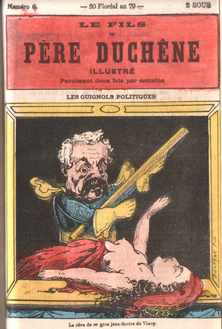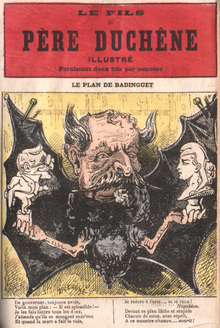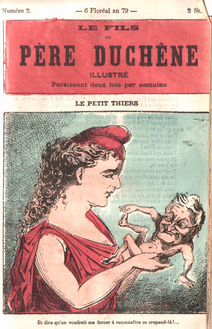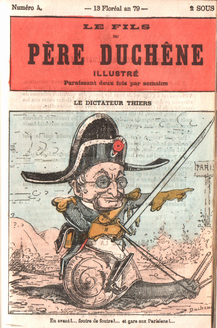The Commune Becomes More Radical

 Frederick Brown,
Zola: A Life
(New York: Farrar, Strauss, Giroux, 1995), pp.217-218.
Frederick Brown,
Zola: A Life
(New York: Farrar, Strauss, Giroux, 1995), pp.217-218.
Communards were spoiling for Armageddon as fervently as right-wing
deputies [of the Provisonal
Government at Versailles]. A movement whose initial goal had been
municipal independence soon consecrated the rift between the
ancien regime and the new order. "The communal revolution . . .
inaugurates a new era of scientific, positive , experimental politics,"
the Commune proclaimed on April 19 in a manifesto: "It's the end of the
old governmental and clerical world, of militarism, of bureaucracy, of
exploitation, of speculation, of monopolies, of privileges to which the
proletariat owes its servitude and the nation its disasters. May this
great, beloved fatherland deceived by lies and calumnies reassure
itself! The struggle between Paris and Versailles is of a kind that
cannot end in illusory compromises: the outcome will be unambiguous.
Victory pursued with irrepressible energy by the National Guards, is our
aim and our due. We appeal to France!
Throughout April, decrees rained thick and fast. Rent unpaid since
October 1870 was canceled. The grace period on overdue bills was
extended three years. Night work for bakery workers was made illegal. A
Labor and Exchange Commission authorized producers' cooperatives, of
which forty-three had come into existence by May 14, to take over
deserted ateliers. Mortmain property [that
owned by the Church] was nationalized when church was separated from
state. And anticlericalism fostered secular education. "Religious or
dogmatic instruction should . . . immediately and radically be
suppressed, for both sexes, in all schools and establishments supported
by the taxpayer," demanded Education Nouvelle, a group whose leader
subsequently helped individual school districts reform their curricula.
"Further, liturgical objects and religious images should be removed from
public view. Neither prayers, nor dogma, nor anything that pertains to
the individual conscience should be taught or practiced in common. Only
one method should hold sway, the experimental or scientific, which is
based upon the observation of facts, whatever their nature -- physical,
moral, intellectual." As priests and nuns were, of course, religious
images incarnate, most removed themselves from the classroom (except in
western Paris, where wealth defended tradition),
forcing Edouard Vaillant, the Commune's commissioner of
education, to open a recruitment center for teachers, or soi-disant [so-called] teachers, at City Hall.
 Little
newspapers (some, like Le Père
Duchesne, with names
that evoked the first
Revolution) multiplied
as fast as cooperatives, but
Little
newspapers (some, like Le Père
Duchesne, with names
that evoked the first
Revolution) multiplied
as fast as cooperatives, but many big ones vanished overnight, for the Commune, despite its professed
libertarianism, brooked no opposition from the bourgeois press. Freedom
stopped where treason began, and treason began wherever an editor fought
shy of direct democracy. First to disappear were Le Figaro
and Le
Gaulois. On
April 14 the Comité de
Sûreté Générale [the Committee on
General Security] had
Paris-Journal,
Le
Journal des débats,
Le Constitutionnel, and La
Liberté close shop. Two weeks later another purge silenced
La Cloche Le
Soir, Le Bien public,
and L'Opinion
nationale, with the Sûreté explaining how
dangerous it would be to countenance, in besieged Paris "newspapers that
openly preach civil war, give the
enemy strategic information, and calumniate defenders of the
Republic." Paranoia took
command as Versailles crept closer, and on May 5, when
La Petite Presse,
Le Petit Journal, and Le Temps
followed their brethren to the scaffold, they were dubbed "the most
active auxiliaries of the enemies of Paris and the Republic."
many big ones vanished overnight, for the Commune, despite its professed
libertarianism, brooked no opposition from the bourgeois press. Freedom
stopped where treason began, and treason began wherever an editor fought
shy of direct democracy. First to disappear were Le Figaro
and Le
Gaulois. On
April 14 the Comité de
Sûreté Générale [the Committee on
General Security] had
Paris-Journal,
Le
Journal des débats,
Le Constitutionnel, and La
Liberté close shop. Two weeks later another purge silenced
La Cloche Le
Soir, Le Bien public,
and L'Opinion
nationale, with the Sûreté explaining how
dangerous it would be to countenance, in besieged Paris "newspapers that
openly preach civil war, give the
enemy strategic information, and calumniate defenders of the
Republic." Paranoia took
command as Versailles crept closer, and on May 5, when
La Petite Presse,
Le Petit Journal, and Le Temps
followed their brethren to the scaffold, they were dubbed "the most
active auxiliaries of the enemies of Paris and the Republic."